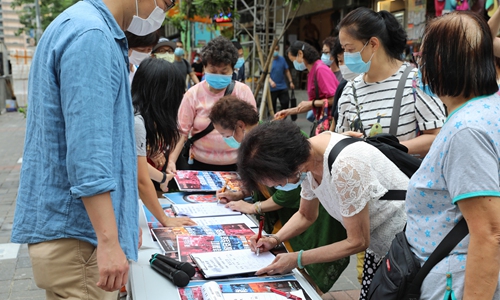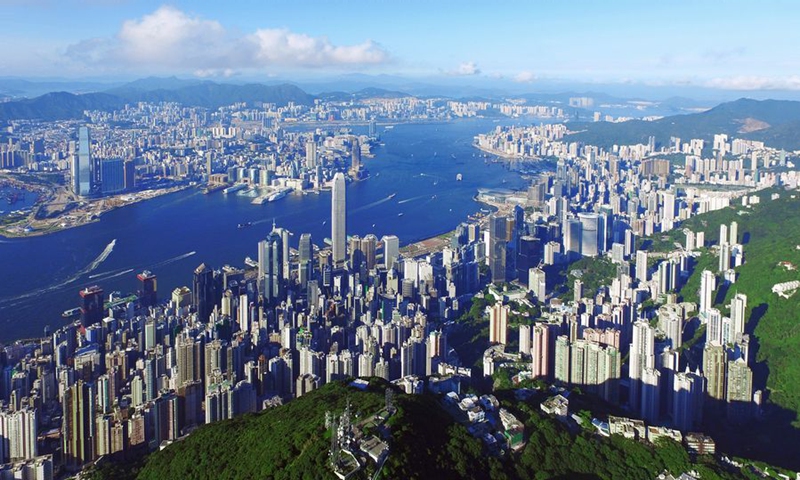Rioters resume protests against national security law in 'deathbed struggle'
By Chen Qingqing and Leng Shumei Source:Global Times Published: 2020/5/25 0:23:39
Looming new law to ensure legitimate rights of Hong Kong majority, targeting rioters engaging in subversion, terrorism and treason

Hong Kong residents from all walks of life collect online signatures and hold a gathering on Sunday morning to show their support for the draft bill to safeguard the national security law to be implemented in the Hong Kong Special Administrative Region. The legal agenda was announced on Thursday night. Photo: cnsphoto
Various black-clad protesters descended into the streets of Hong Kong on Sunday, taking part in illegal protests, defying the proposed national security law, claiming it erodes the "one country, two systems" principle and infringes upon their legitimate rights. The Sunday protests have been rapidly dispersed by Hong Kong police.
Despite their efforts to resume last year's months-long protests, the violent behaviors, like attacking innocent residents, setting up road barricades and hurling hard objects at passers-by, which endangers the peaceful life in the once-prosperous city, could not disguise their real intentions of instigating hatred, subversion and even terrorism in the special administrative region of China. Once the national security law comes into effect, violent protesters could be held accountable facing severe legal punishment, some observers said.
At around 1 pm on Sunday, groups of black-clad protesters gathered at Causeway Bay marching along Hennessy Road and shouting out slogans such as "Hong Kong independence." The tactics to evade police they used in anti-government protests throughout 2019 were adopted again.
Protesters' main goal: oppose the looming national security law for Hong Kong after the draft decision on establishing and improving the legal system and enforcement mechanisms for the Hong Kong Special Administrative Region (HKSAR) to safeguard national security was submitted to China's top legislature on Friday during the two sessions - the most important annual political event in the country.
The draft stipulates that the relevant legislative responsibilities of the NPC Standing Committee are to effectively prevent, stop, and punish any activity occurring in the HKSAR territory that attempts to split the country, subvert state power, organize and perpetrate terrorist activities, including other actions that seriously endanger national security.
The months-long anti-extradition bill protest in Hong Kong had escalated into social unrest, which harmed the national security of China and harbored separatist activities. For instance, radical protesters bluntly desecrated the national flag, defaced the national emblem, and instigated anti-mainland sentiment in Hong Kong.
"It's more like a deathbed struggle," a Hong Kong resident said in a shared post on social media, referring to Sunday's protests, which have become a repeated scenario from the past as rioters attacked innocent people who disagreed with them.

Hong Kong residents sign their names on Friday in support of the Hong Kong national security law. A draft decision of the law was submitted to China's top legislature on Friday. Photo: cnsphoto
Act of terrorism
Some pan-democracy lawmakers and activists such as Yip Kam Lung Sam and Tam Tak-chi, who took part in illegal gatherings, both have been swiftly detained on Sunday by the Hong Kong Police Force (HKPF), which has enforced the law quickly and effectively.
Since the beginning of the year, some former and current public security officials told the Global Times that there has been an apparent shift in the HKPF's approach regarding law enforcement, as it has been showing zero tolerance for lawless culprits who pose a threat to the lives of ordinary Hong Kong residents.
As of 4:30 pm Sunday afternoon, at least 120 have been arrested, most for unlawful assembly, according to local media outlet hk01.com. Some even hurled the bricks to police officers. HKPF strongly condemned such violent behavior.
The protest, without permission from the police, was fueled by various posts circulating online as part of a plotted anti-government campaign targeting the national security law. Leading activists like Joshua Wong and Apple Daily founder Jimmy Lai began posting "brainwashing" threads on social media, calling on more Hong Kong people to fight against the national security law, depicting it as an intrusion into their freedom that erodes the "one country, two systems."
The national security law is specifically aimed at criminal behavior that harms national security. It would not affect normal Hong Kong citizens' legitimate rights, Tian Feilong, a Hong Kong affairs expert and associate professor at Beihang University in Beijing, told the Global Times on Sunday.
"On the contrary, as the law clarifies criminal behavior, normal residents would exercise their legitimate rights more safely without fear of being threatened or attacked by terrorists and violent activists after voicing their differing opinions and political stances," he said.
Some observers on the Hong Kong social movement indicated that to arouse new illegal movement indeed reflected the desperation of those rioters, who understand they have been breaking the law and would be punished one day in a society ruled by the law. Rioters may face sentences of at least five years imprisonment, or 10 years after taking reference from China's Criminal Law.
"The clauses in the Hong Kong national security law can be formulated via reference to standards in the criminal law of the Chinese mainland and similar regulations in foreign countries," Tian said, noting that the law should also include clauses to accurately define criminal behavior, find evidence and carry out punishments.
NPC Standing Committee member Tam Yiu-chung echoed Tian's view by saying that when drafting the law, the top legislators will fully take into consideration both domestic legislature and national security laws in other countries, for example the US, into account. "If foreign countries have national security laws to defend their sovereignty, why can't China do the same?" he asked.
In the US, people who are found guilty of treason could face death penalty in the most severe cases.
The new national security law for Hong Kong would take effect by being included in Annex III of the Basic Law, as some Hong Kong media outlets have predicted, which needs no approval from Hong Kong's Legislative Council.

Aerial photo taken on June 27, 2017, shows the scenery on both sides of the Victoria Harbour in Hong Kong, southern China. (Xinhua/Lui Siu Wai)
Foreign interference
More than 200 parliamentarians and policymakers from 23 countries tried to interfere in Hong Kong affairs, criticizing the national security law for Hong Kong, including former Hong Kong governor Chris Patten, former British foreign secretary Malcolm Rifkind and US Senator Ted Cruz.
Hong Kong's national security law will not affect the city's high degree of autonomy, the rights and freedom enjoyed by its residents, or the legitimate rights of foreign investors, said Chinese State Councilor and Foreign Minister Wang Yi on Sunday.
"Hong Kong's affairs are the internal affairs of China, and not interfering in a nation's internal affairs is the principle of global relationships," Wang said.
He noted that the National Security Law is aimed at a very narrow range of actions that harm national security. It won't affect the majority of Hong Kong residents in terms of freedoms and legitimate rights under the Basic Law, and won't affect the city's business environment. Passing the law will also help maintain the "One country, two systems."
Concerning those pan-democracy lawmakers and activists who again smear the legitimacy of the national security law for Hong Kong, misinterpreting it as a violation of a series of local residents' rights including freedom of the press, freedom of speech and freedom of religious association, Tam said pro-establishment groups in addition to the Hong Kong SAR government are committed to explaining the law to local residents.
"My team and I will do our utmost to inform and explain the relevance of this law to the public, in countering unreasonable attacks and smear campaigns conducted by anti-China and anti-government forces," Carrie Lam, chief executive of the Hong Kong SAR government, said in a Facebook post on Sunday, noting that she believes that the vast majority of Hong Kong residents understand the situation and will not be deceived by forces that undermine peace.
A growing number of Chinese netizens on social media have been praising the law, calling for charges of treason against activists like Wong and Lai as they have been colluding with foreign forces and are in contact with US agencies like the National Endowment for Democracy (NED) and the CIA, according to open records and transcripts of their interviews. Wong even flied to the US in 2019, persuading US politicians to pass the Hong Kong Human Rights and Democracy Act, which, some observers called, as convincing evidence for their acts of challenging sovereignty and inciting subversion.
The law shall not have any retroactive effect, so the previous instigation of rioting by of activists such as Lai and Wong could not be used as evidence for their activities after the national security law takes effect, according to Tian.
"But if they continue inciting and organizing violent acts after the law takes effect, they would be convicted according to the law based on evidence at that time," Tian said.
Some national lawmakers, top political advisors and lawyers told the Global Times in a recent interview that the work of formulating the national security legislation would be accelerated, which would be enacted into law as early as the coming weeks considering the urgency.
Kennedy Wong Ying-ho, a member for the National Committee of Chinese People's Political Consultative Conference (CPPCC) and solicitor at the Supreme Court of Hong Kong, told the Global Times on Friday that the law would enable national security institutions to establish special agencies in Hong Kong, which are likely to be in charge of intelligence collection, counter-terrorism work and law enforcement.